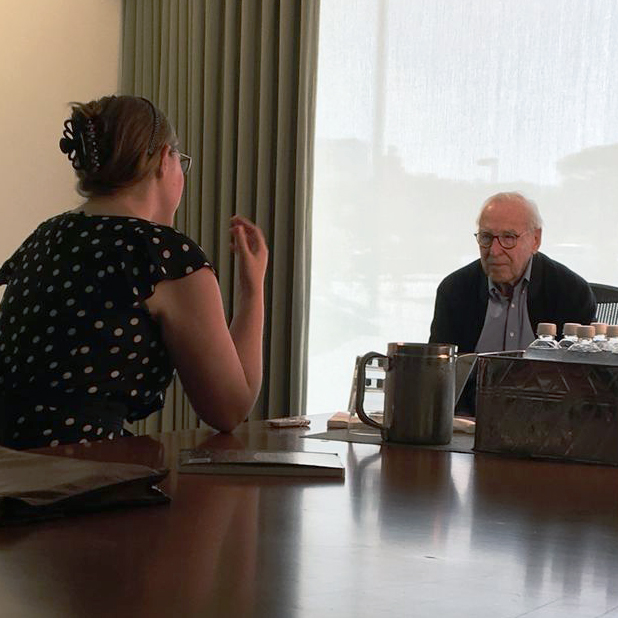When a Crisis Hits, Remember What Capt. Lovell Said

Header Image: Senior Writer Aubrey Henretty interviews Captain Lovell in 2016.
It was the second week at home when I remembered what Capt. Lovell said about surviving Apollo 13.
The first week had been a blur of stress-cleaning, stress-cardio, hyperproductivity, and Apocalypse Lentil Soup. I am an anxious person even in non-pandemic times, and I was coping with this actual disaster the same way I usually cope with hypothetical ones: by trying to do everything all at once, to consider every possible problem, to be the most prepared.
This is a bad strategy.
By week two, when I went hunting for the audio clip, I was crashing. I knew I wouldn’t be able to maintain my current levels of efficiency and vigilance, but I hadn’t stopped trying yet.
The clip is from 2016. Capt. Lovell had come to the Adler to record an oral history with Andrew Johnston, our vice president of astronomy. I was in the room to ask some pre-written questions for our member magazine. Still relatively new to writing about science professionally (and brand new to writing about space), I felt like I had slipped in through a side door and might be asked to leave at any moment. If I stuck very closely to the script—the few questions I had brought—maybe I could fly under the radar a little bit longer.
Apollo 13’s exploding oxygen tank was a different kind of crisis than a pandemic—more sudden, more localized, less expected. But there are similarities. The situation called on people to use their skills in new ways. Everyone was afraid. No one knew how it would end.
At the very end of the oral history, I did get to ask Capt. Lovell one unscripted question. Having made it through all of his notes, Andrew asked me if I had any other questions. I had about a thousand, but I knew instantly which one I needed to ask. It was a follow-up to something Capt. Lovell had said in passing a few minutes earlier—that he didn’t really worry about crises anymore. Right before I managed to switch my recorder back on, I asked him to elaborate. Were there specific things that used to stress him out but now seemed harmless? How did this extraterrestrial calm manifest in his everyday life?
It was not competence that saved the crew of Apollo 13. Even when you are the most prepared people on (and off) the planet—like Capt. Lovell, his crew, and the mission control team at NASA were—you cannot predict everything that might go wrong. Sometimes things will explode and you won’t know what to do. Sometimes you will be far away from people who need your help or people who can help you.
When I finally located the clip, I felt a wave of relief. The file came from the little white recorder I sometimes use so I don’t have to take notes during interviews. The audio quality was even worse than I remembered, but the words were like oxygen. I took a breath.
I hope you’ll listen for yourself, but if you don’t have three more minutes to spare, here’s an inferior summary: When a crisis hits and you’re still alive, you shake off the shock and do whatever you can, even if it feels very small. Then, if there is a next thing, you do that. With a little luck and a lot of people doing their part from wherever they are, you’ll make it home. Or out of your home, as the case may be.
Captain Lovell talks about surviving a crisis.
Stay safe, everyone.
***UPDATE! After I dug up the audio clip from my old recorder, our marketing specialist Dana heroically scoured our video production archive and found the original video, which is much higher-quality! I stand by the charm of my little recorder version (maybe because it’s the one that was there, in my home, to pull me back from the brink of panic), but thanks to Dana, you can decide for yourself.







